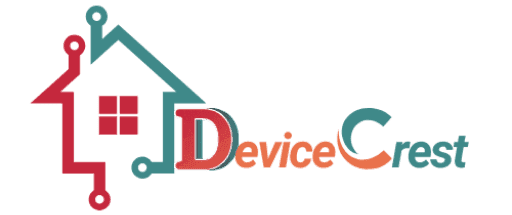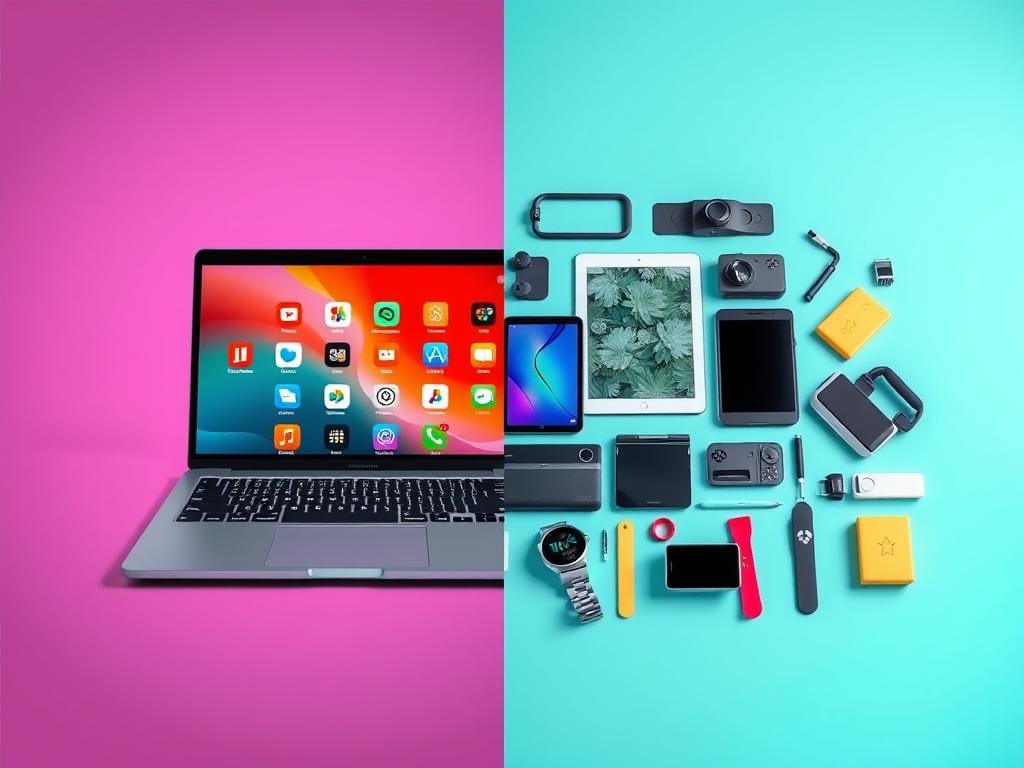In today’s fast-paced digital world, we’re all looking for ways to be more productive. We have to choose between using productivity apps or tech gadgets to get the job done. From AI helpers to ergonomic desks, technology offers many ways to improve our work lives.
Sarah, a marketing manager, found her productivity apps to be a game-changer. With tools for managing tasks and tracking time, she took back control of her day. She streamlined her work and focused better. On the other hand, Alex, her colleague, relied on his tech gadgets. He used a standing desk, noise-canceling headphones, and a wireless charger. He felt more energetic, stood better, and was less distracted.
Both Sarah and Alex saw big improvements in their work thanks to technology. But which one is better for boosting work efficiency? In this article, we’ll look at the good and bad of both apps and gadgets. We’ll help you choose what’s best for you and your work space.
Key Takeaways
- Productivity apps offer AI-powered assistance, task management, and time tracking capabilities to enhance digital workflows.
- Tech gadgets like standing desks, noise-canceling headphones, and smart assistants provide physical solutions to improve focus, comfort, and ergonomics.
- The choice between apps and gadgets depends on individual preferences, work environment, and specific productivity challenges.
- A balanced approach incorporating both digital and physical tools can often yield the most effective results in boosting work efficiency.
- Evaluating the cost-benefit ratio, integration capabilities, and learning curves associated with various productivity solutions is critical for making the right investment.
Understanding the Impact of Digital Tools on Modern Workplace
The modern workplace has changed a lot with digital tools. From personal computers to cloud-based platforms, technology has changed how we work. remote work tools, tech for productivity, and innovation in tech are key in today’s workplace.
Evolution of Workplace Technology
Workplace technology has changed a lot over the years. Studies show two-thirds of US jobs could be automated. efficiency hacks like AI and automation tools help employees focus on creative tasks.
The Rise of Digital Productivity Solutions
bestappsforwork and gadgetsforsuccess have changed productivity and teamwork. Cloud technology helps a diverse workforce. It also makes remote work easier, improving work-life balance.
Current Workplace Efficiency Challenges
Digital tools bring many benefits but also challenges. Cybersecurity tools protect data, but learning new tech can be overwhelming. Companies must train employees well to handle this.
| Benefit | Impact |
|---|---|
| Reduced operational expenses | Companies adopting workplace technologies can decrease operational expenses by automating routine tasks. |
| Improved communication and collaboration | Organizations that embrace workplace technologies enhance communication and collaboration among remote teams, fostering tighter intra-organizational connections. |
| Increased productivity and revenue | 77% of remote workers reported higher productivity levels, and organizations implementing digital workplaces have seen a 43% increase in revenue. |
| Enhanced employee satisfaction and retention | Companies with a digital workplace experience a 25% lower turnover rate, and employees working remotely even just once a month are 24% more likely to feel happy while working. |
It’s important to understand how workplace technology has evolved. Knowing the benefits and challenges of digital tools helps improve workplace efficiency.
Productivity Apps vs. Tech Gadgets: The Core Differences
In the world of work technology, there’s a big debate. It’s about productivity apps versus tech gadgets. Both want to make work better, but in different ways. Productivity apps like Trello and Asana help organize tasks and work together. They work well on many devices and fit with other apps.
Tech gadgets, like the Ember Smart Mug or noise-canceling headphones, solve real work problems. They make the work space better, helping you focus and feel good. Apps are great for digital tasks, but gadgets help with the physical stuff.
Choosing between productivity apps and tech gadgets depends on your work and what you like. If you’re into digital stuff and working together, apps might be best. But if you want to make your work space better, gadgets could be the way to go.
| Productivity Apps | Tech Gadgets |
|---|---|
|
|
Using both productivity apps and tech gadgets can make work even better. They work together to make your work place more efficient and help you succeed.
Essential Productivity Apps for Professional Success
In today’s fast-paced world, productivity apps are key for professionals. They help streamline work and boost efficiency. These digital productivity aids cover tasks, communication, and time tracking, making work easier.
Task Management and Organization Apps
Apps like Todoist help manage tasks well. They sync across devices and offer AI help. Todoist has a free version and a paid one starting at $5 a month.
Communication and Collaboration Tools
Slack is a top choice for team work. It makes sharing info easy and reduces emails. Slack’s AI insights help teams work better together.
Time Tracking and Focus Enhancement Apps
RescueTime tracks how you spend time on your devices. It helps improve time use. RescueTime offers a free version and paid plans starting at $6 a month.
Other apps like Forest and Pomodoro timers help stay focused. They make work more productive.
These work optimization apps help professionals work better. They improve time use and boost gadgets for efficiency in daily tasks.
| App | Key Features | Pricing |
|---|---|---|
| Todoist | Task management, organization, AI-powered assistance | Free, $5/month paid plan |
| Slack | Team communication, collaboration, integration with other apps | Free, paid plans available |
| RescueTime | Time tracking, productivity insights, focus enhancement | Free, $6/month paid plan |
| Forest | Focus and distraction-free work sessions | $1.99 for iOS, $1.99 for Android |
| Pomodoro Timers | Work-break cycle management for improved productivity | Free, paid versions available |

“Productivity apps have become essential tools for professionals seeking to optimize their workflows and achieve greater efficiency in the modern workplace.”
Game-Changing Tech Gadgets for Workplace Efficiency
In today’s fast-paced work environment, being productive is key. Luckily, many tech gadgets have come out to help with worke fficiency and boost your productivity. These gadgets for success are changing the modern workplace.
The Uplift V2 standing desk helps you stay in good posture. It lets you switch between sitting and standing all day. Pair it with the Sony WH-1000XM4 noise-canceling headphones for better focus in loud places.
The Amazon Echo Dot is a voice-activated innovationintech that makes tasks easier with simple commands. Ergonomic keyboards and mice, like the Lovaky MK98 and Logitech M185, also help by reducing strain during long work hours.
Portable chargers and cable organizers, such as the Seagate Portable 2TB hard drive and the SOULWIT cable holder, keep your devices charged and your space tidy. These techgadgets tackle physical and environmental challenges that can slow you down, making your work better.
The market is full of gadget review tools for better collaboration, communication, and task management. Adding these tech gadgets to your work can greatly improve your productivity and change how you do your job.
“The secret of getting ahead is getting started.” – Mark Twain
So, why not check out the latest techgadgets and see how they can boost your worke efficiency and success? These tools can take your productivity to new levels, from your desk to the conference room.

Cost-Benefit Analysis: Apps versus Physical Tools
The digital revolution is changing the workplace. The debate between apps and physical tools is growing. Companies must think about the costs and benefits of each.
Apps are often cheaper upfront but may cost more over time. Physical tools are pricier at first but can save money in the long run.
Initial Investment Considerations
Apps like Trello or Asana can help manage tasks and work together better. But, you have to pay for them every month. Physical tools, like standing desks, cost more at first but can help employees stay healthy.
Long-term Value Assessment
Looking at the long-term value of tools is key. You need to think about how they scale, their upkeep, and how they improve work. Digital tools are flexible and easy to use for teams working from home. But, they need internet and people to use them.
Physical tools can make the workplace healthier and last longer. They are a solid investment in the workplace.
Return on Investment Metrics
Figuring out the return on investment (ROI) for tools is important. Apps can show ROI right away by helping manage tasks. Gadgets can improve health and cut down on sick days over time.
Choosing between apps and gadgets depends on their short and long-term effects. It’s about how they impact work, happiness, and quality.

“Embracing the right balance of digital and physical productivity tools is essential for fostering a thriving, sustainable workplace in the modern era.”
Integration and Compatibility Challenges
The world of productivity tools and gadgets is always changing. This makes integration and compatibility a big challenge for tech-savvy users and companies. It’s important for different mobile apps, time management tools, organization software, and digital productivity aids to work well together. This helps everyone stay efficient and avoid problems at work.
One big challenge is making sure apps work well on many platforms and devices. These tools need to share data, tasks, and workflows smoothly. This way, users can get to their info from anywhere, at any time. Being able to work across different platforms is key for staying focused and productive in today’s fast-paced work world.
Adding physical tech gadgets to the workplace can also cause problems. For example, smart assistants need to work with lots of IoT devices and apps to be useful. It’s important to make sure new tools fit well with what’s already being used. This helps boost productivity and keeps things running smoothly.
| Integration Challenges | Compatibility Issues |
|---|---|
|
|
When introducing new productivity tools, companies need to think about their current tech ecosystem. This helps avoid problems with compatibility. By tackling these challenges, businesses can make the most of tech savvy tools and gadgets. This leads to better efficiency and success in today’s workplace.

“Seamless integration and compatibility are the keys to unlocking the true power of productivity-enhancing technology.”
The Human Factor: Adaptation and Learning Curves
Exploring productivity apps and tech gadgets shows us the importance of the human factor. It’s about how well we adapt and learn from these tools. To really use them well, we need to think about what our tech-savvy workers need and want.
Training Requirements for New Tools
The amount of training needed for new tools can really differ. Some apps like ChatGPT are easy to get started with. But, tools like standing desks might need more in-depth training. Companies should invest in good training to help their employees use these tools well.
User Experience and Adoption Rates
The way a tool feels to use is key to its success. If it’s easy to use and fits well with what we already do, people will use it more. But, if it’s hard to figure out, it might not help as much as it could.
Productivity Impact During Transition Periods
When we bring in new tools, it can take some time to get used to them. This can make things a bit harder at first. But, with the right training and support, we can get back to working well. These tools are meant to make our work better, not harder.
“The key to successful technology implementation lies in understanding the human factor – how individuals adapt, learn, and embrace the tools that are designed to enhance their productivity and well-being.”
As technology keeps changing, finding the right balance is key. Good training, easy-to-use tools, and careful planning during changes can help a lot. This way, we can make the most of these tools and improve our work and life balance.
Future Trends in Productivity Technology
The future of productivity is exciting. Productivity apps and tech gadgets are merging. New technologies like AI, AR, and IoT are changing how we work.
AI apps are getting smarter. They give personalized advice and do tasks for us. tech trends 2023, app review, and innovationin tech are leading this AI revolution.
AR gadgets will change how we work together. They let us see and work on tasks in new ways. This mix of gadget review and tech savvy will make work better.
IoT devices will make our workspaces smarter. They connect our physical and digital worlds. Smart desks and health-tracking wearables will change the office.
These techs will make our work more personal and connected. We’ll have tools that fit our unique needs. This will help us work better, not harder.
“The future of productivity is an integrated, AI-enhanced ecosystem that adapts to the unique needs of each individual and team.”
By using these innovationin tech and tech savvy trends, companies can do more. They’ll work better together and innovate more. This will lead to success in the future.
Conclusion
Choosing between productivity apps and tech gadgets depends on what you need and like. Apps are great for organizing digital stuff and working together online. Gadgets help solve real-world problems at work.
Using both apps and gadgets together is often the best way. This creates a well-rounded productivity ecosystem.
As tech gets better, we’ll see more AI, AR, and IoT in our work tools. The secret to being more productive is picking the right tools for your job. By using digital tools and tech gadgets wisely, you can work smarter, not harder. This way, you’ll manage your time better and achieve more.
🚀 Unlock Your Peak Productivity Today! 🚀
Struggling to get more done in less time? We’ve got you covered! Discover actionable tips and proven strategies to supercharge your efficiency and achieve your goals faster in our latest blog post. 📝✨
👉 Read it now: Boost Your Productivity
💡 Don’t let time slip away—start building better habits and mastering your productivity now. Let us know your favorite tip from the article in the comments!



1 thought on “Productivity Apps vs. Tech Gadgets: Which Boosts Work Efficiency More?”